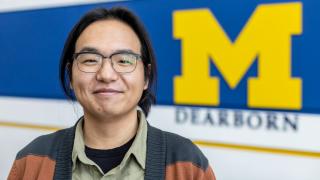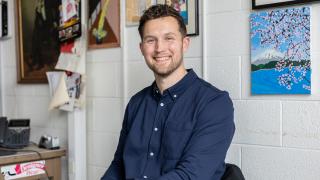
Muna Al-Siyabi will return to her home country this summer as the first Omani instructor at Sultan Qaboos University with a master’s degree in early childhood education and a focus on special education.
It’s a distinction that brings certain benefits. For starters, she’ll become a leading advocate for children with special needs.
There is a downside, though.
“ special education is a new major in Oman, we don’t have resources on the subject yet,” said Al-Siyabi, who earned her master’s degree this spring from University of Michigan-Dearborn. “None of the resources discuss new trends in teaching or educating young children with disabilities.”
She wanted to purchase additional materials to take back with her; but Kim Killu had a different idea.
The UM-Dearborn professor of special education recently moved offices and purged a glut of teaching and learning resources in the process of relocating. That stockpile, along with materials from retiring professor Belinda Lazarus, now will travel back to Oman with Al-Siyabi.
Al-Siyabi plans to use the materials as an instructor at Sultan Qaboos.
“I am planning to advocate for children with special needs and these resources will be one way to increase my awareness about different issues related to special education,” she said. “Looking at different researches done in special education will give us guidelines about how we are going to teach individuals with disabilities.”
Sharing resources with colleagues abroad is nothing new for Killu. She often ships materials to friends and former classmates in Africa and South America who have limited access to academic materials.
“I think it’s important for us to share what we have here and pass it along to other people who don’t have access to what we have,” Killu said. “Textbooks are useful, older journals, assessment instruments, curriculum materials—they can use that in their courses.”
Killu says professors use these resources to provide more current information to their students, which helps in the classroom as well as in clinical experiences.
That’s how Al-Siyabi plans to use her new materials. They’ll serve as a starting point as Al-Siyabi and her students conduct their own research.
“I would like to work with my students to apply some research-based practices in teaching children with disabilities,” she said. “We will use the data we collect to help us make recommendation on how we can provide good services for young children.”

